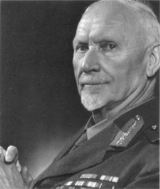
, CH, ED
, KC, FRS
, PC
(24 May 1870 – 11 September 1950) was a prominent South African and British Commonwealth
statesman
, military leader and philosopher. In addition to holding various cabinet posts, he served as Prime Minister of the Union of South Africa
from 1919 until 1924 and from 1939 until 1948. He served in the First World War and as a British field marshal in the Second World War.
Since earlier in his life and for most of his political life, Smuts believed in racial separation.
In all the previous cases of wholes, we have nowhere been able to argue from the parts of the whole. Compared to its parts, the whole constituted by them is something quite different, something creatively new, as we have seen. Creative evolution synthesises from the parts a new entity not only different from them, but quite transcending them. That is the essence of a whole. It is always transcendent to its parts, and its character cannot be inferred from the characters of its parts.
![]()
... the tendency in nature to form wholes that are greater than the sum of the parts through creative evolution ...![]()
Having no human companion I felt a spirit of comradeship for the objects of nature around me. In my childish way I communed with these as with my own soul; they became the sharers of my confidence.
![]()
The intimate rapport with nature is one of the most precious things in life. Nature is indeed very close to us; sometimes closer than hands and feet, of which in truth she is but the extension. The emotional appeal of nature is tremendous, sometimes almost more than one can bear.![]()
The British Empire is the greatest stimulant of organised freedom which the world has ever known. By geography, by experience, by practical idealism, by political maturity, by character, the British have a part to play which no other race could do so well.![]()

